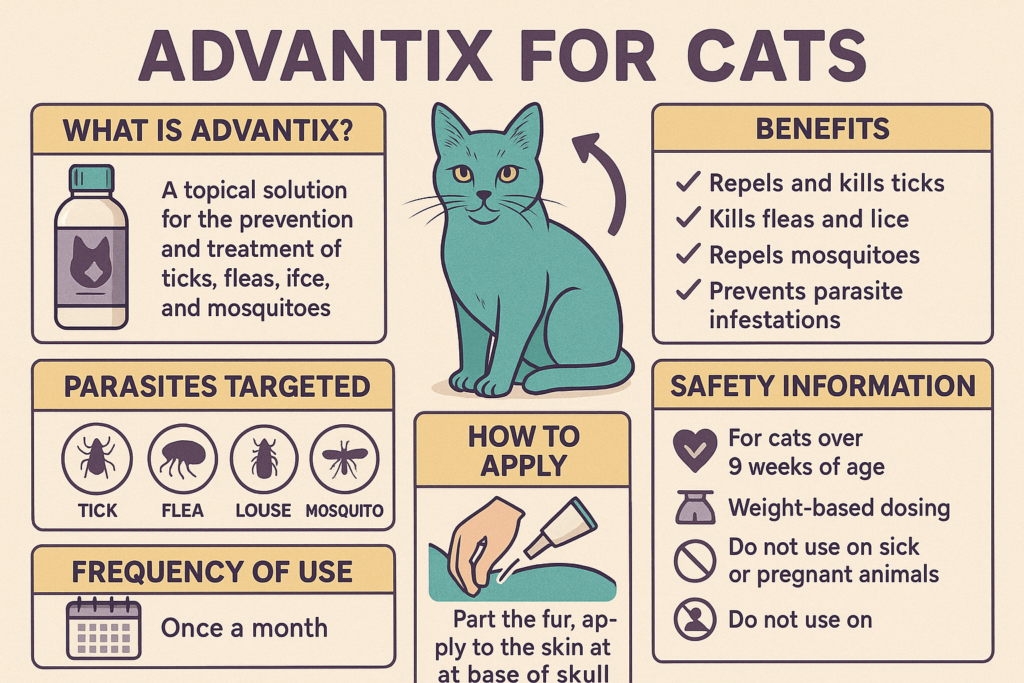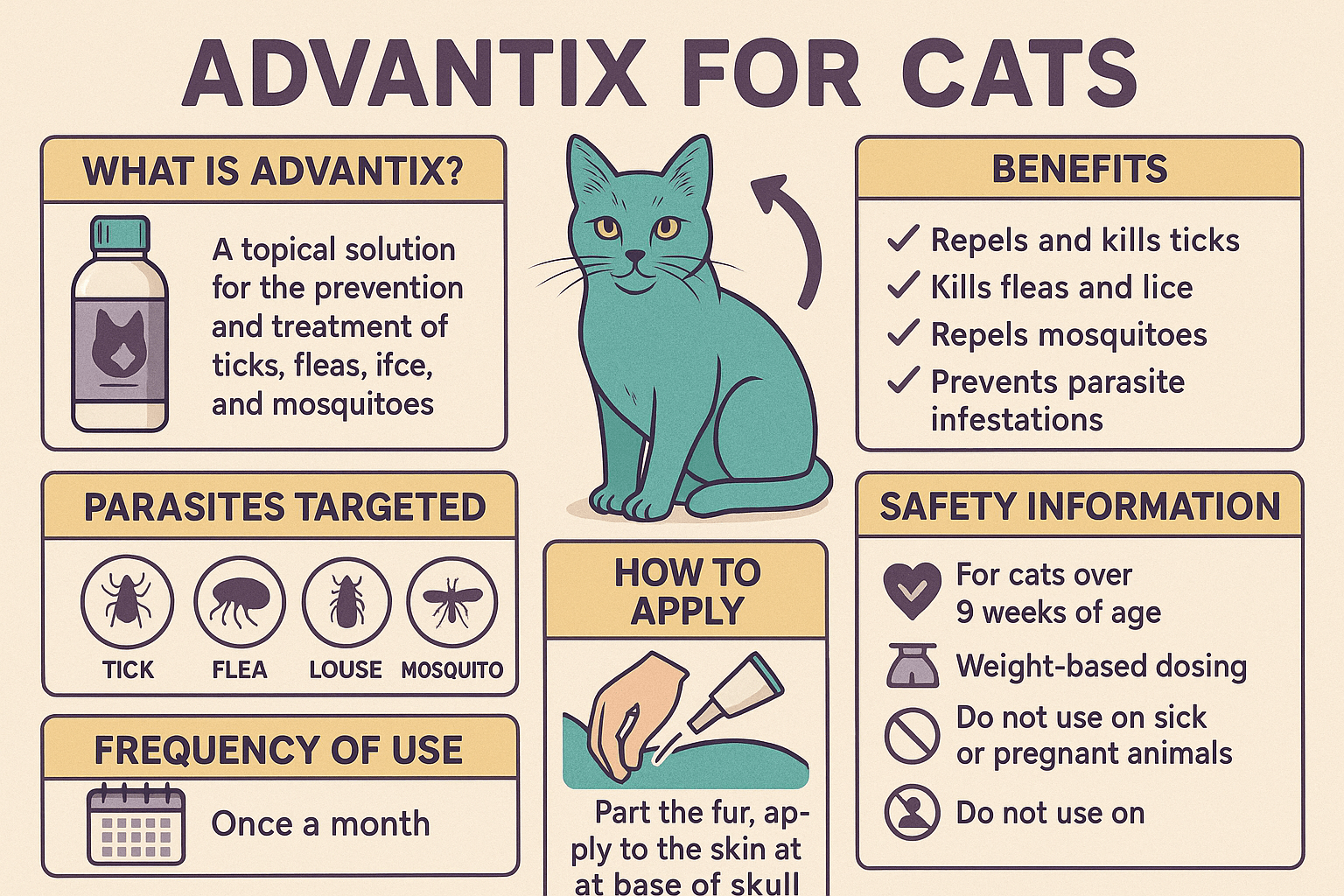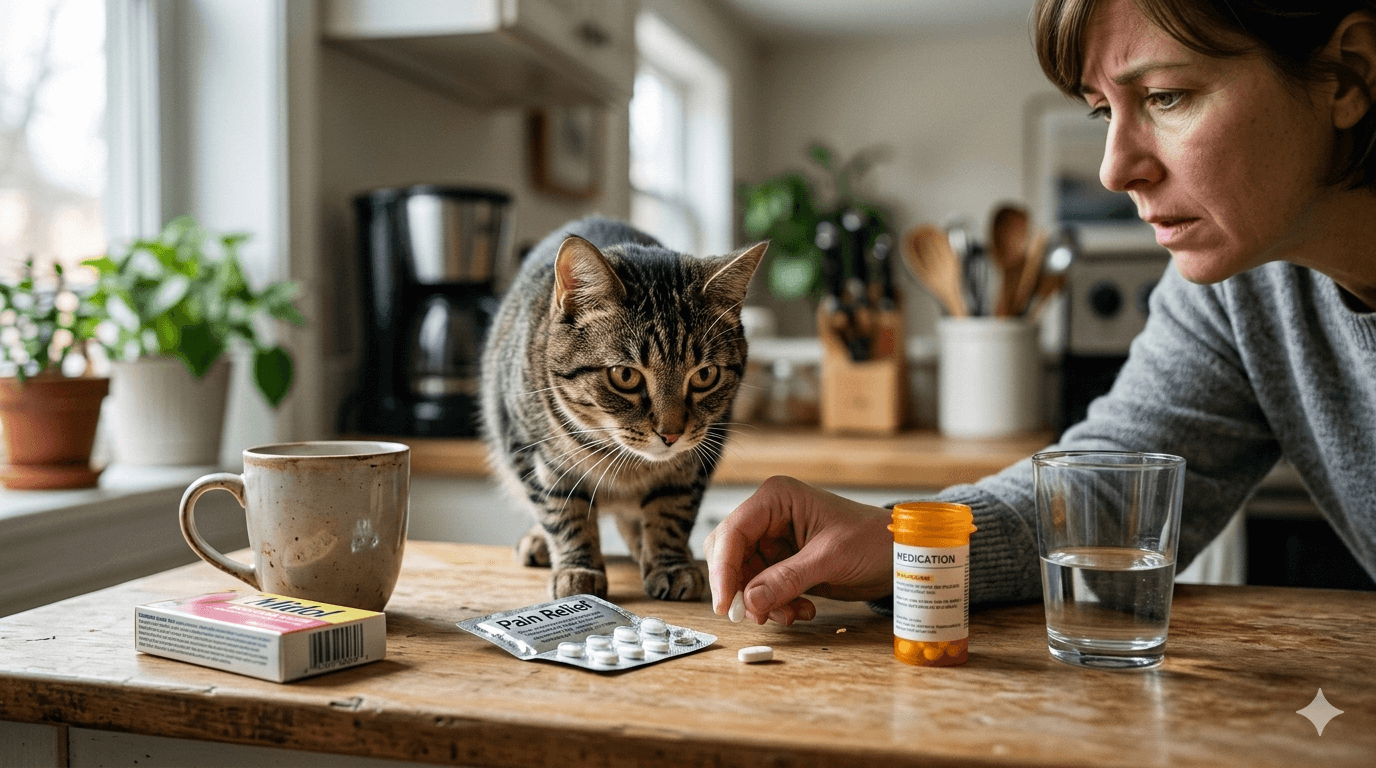Advantix for Cats: Is It Safe and Effective?
When it comes to protecting our feline companions from pests like fleas, ticks, and mosquitoes, choosing the right treatment is crucial. One product that often comes up in discussions is Advantix, a popular topical solution designed to combat parasites. However, while Advantix is widely used for dogs, its suitability for cats raises important questions. Understanding how Advantix works, its potential risks, and alternative solutions can help cat owners make informed decisions about their pet’s health. Let’s explore everything you need to know about Advantix for cats and ensure your furry friend stays safe and parasite-free.
Why Advantix Is Not Recommended for Cats
While Advantix is highly effective for dogs, it is not formulated for use on cats due to specific ingredients that can be harmful to felines. Here are the key reasons why Advantix should never be applied to cats.
Contains Permethrin:
Permethrin, a common ingredient in dog flea treatments, is toxic to cats. Even small amounts can cause severe reactions, including tremors and seizures.Risk of Licking or Grooming:
Cats are meticulous groomers. If they come into contact with a dog treated with Advantix, they may ingest the toxic chemicals through licking.Lack of Feline-Specific Formulation:
Advantix is specifically designed for dogs and does not account for the unique physiology and sensitivity of cats.Potential for Severe Side Effects:
Symptoms of permethrin toxicity in cats include vomiting, drooling, difficulty breathing, and even death in extreme cases.Veterinary Warnings Against Use:
Most veterinarians strongly advise against using dog-specific products like Advantix on cats, emphasizing the importance of species-appropriate treatments.
Understanding these risks highlights the importance of choosing cat-safe alternatives to protect your pet from parasites.

Symptoms of Permethrin Toxicity in Cats
If a cat is accidentally exposed to Advantix or other permethrin-containing products, recognizing the symptoms early can save their life. Here’s what to watch for if you suspect your cat has been poisoned.
Muscle Tremors and Shaking:
One of the earliest signs of permethrin toxicity is involuntary muscle tremors or twitching.Seizures:
Severe cases of exposure can lead to full-body seizures, which require immediate veterinary attention.Excessive Drooling:
Cats may begin drooling excessively as their body reacts to the toxic substance.Difficulty Walking or Coordination Issues:
Affected cats may appear unsteady on their feet or struggle to move normally.Vomiting or Diarrhea:
Gastrointestinal distress is another common symptom of permethrin poisoning in cats.
If you notice any of these signs after accidental exposure, seek emergency veterinary care immediately to prevent further complications.
Check this guide 👉Tall Indoor Plants Safe for Cats: Best 7 Expert Tips!
Check this guide 👉Mirtazapine for Cats: Best 7 Expert Tips!
Check this guide 👉Solensia for Cats: Best 7 Expert Tips!
Cat-Safe Flea Treatments | Dog-Specific Products (Not for Cats) |
|---|---|
Advantage II for Cats | Advantix for Dogs |
Revolution (Stronghold) for Cats | K9 Advantix II |
Seresto Collar for Cats | Frontline Plus for Dogs |
Capstar Tablets for Cats | Vectra 3D for Dogs |
Bravecto Topical for Cats | Permectrin Spray for Dogs |
How to Safely Treat Fleas on Cats
Protecting your cat from fleas requires using products specifically designed for felines. These tips will guide you in choosing and applying safe flea treatments effectively.
Consult Your Veterinarian First:
Always seek professional advice before starting any new flea treatment to ensure it’s appropriate for your cat’s age, weight, and health condition.Use Cat-Specific Products Only:
Stick to treatments labeled explicitly for cats, such as Advantage II or Revolution, which are formulated to meet feline needs.Apply Treatments Correctly:
Follow the instructions carefully, ensuring the product is applied directly to the skin and not ingested during grooming.Monitor for Adverse Reactions:
Watch for any unusual behavior or side effects after application, and contact your vet if concerns arise.Combine Treatments with Preventive Measures:
Regularly clean bedding, vacuum carpets, and wash toys to reduce flea infestations in your home.
By following these guidelines, you can keep your cat comfortable and free from pesky parasites without risking their health.
Tips for Preventing Flea Infestations in Cats
Prevention is always better than cure when it comes to flea infestations. These proactive measures can help keep your cat—and your home—flea-free year-round.
Regular Grooming Sessions:
Brushing your cat’s fur regularly allows you to spot fleas early and remove them before they multiply.Keep Your Home Clean:
Vacuum frequently, especially in areas where your cat spends time, and wash their bedding weekly.Limit Outdoor Exposure:
Minimize your cat’s access to outdoor environments where fleas and ticks thrive, particularly during warmer months.Check for Fleas After Playdates:
Inspect your cat thoroughly if they interact with other animals who may carry fleas.Maintain a Healthy Diet:
A strong immune system can help your cat resist parasites, so provide high-quality food rich in essential nutrients.
By incorporating these habits into your routine, you can significantly reduce the risk of flea infestations in your household.
How to Choose the Right Flea Treatment for Your Cat
Selecting the best flea treatment for your cat involves careful consideration of their unique needs and lifestyle. Here are some factors to keep in mind when making your decision.
Age and Weight Requirements:
Ensure the product is suitable for your cat’s age and weight, as some treatments are only safe for kittens or adult cats.Active Ingredients:
Look for cat-safe active ingredients like fipronil or selamectin, which are proven effective against fleas without causing harm.Ease of Application:
Choose a format that suits your comfort level, whether it’s topical drops, oral tablets, or collars.Duration of Protection:
Some treatments last a month, while others provide extended coverage. Consider how often you’re willing to reapply.Budget-Friendly Options:
Compare prices and consult your vet for affordable yet effective recommendations tailored to your budget.
Taking these factors into account ensures you select a flea treatment that meets both your cat’s needs and your preferences.
Signs Your Cat May Have Fleas
Detecting a flea problem early can prevent discomfort and more serious health issues for your cat. Look out for these telltale signs of an infestation.
Excessive Scratching or Biting:
Persistent scratching indicates irritation caused by flea bites.Visible Fleas or Eggs:
Check your cat’s fur for tiny black specks (flea dirt) or actual fleas moving through their coat.Hair Loss or Bald Patches:
Constant scratching can lead to patches of missing fur, especially around the tail and neck.Red or Irritated Skin:
Flea bites often cause redness, swelling, or scabs on your cat’s skin.Behavioral Changes:
Restlessness or irritability may signal discomfort due to fleas.
Identifying these signs promptly allows you to address the issue before it worsens.
Natural Remedies for Flea Control in Cats
For those seeking non-chemical options, natural remedies can complement traditional flea treatments. While not as potent as medicated solutions, these methods can help manage mild infestations.
Apple Cider Vinegar Spray:
Mix equal parts water and apple cider vinegar to create a repellent spray. Avoid spraying near eyes or sensitive areas.Diatomaceous Earth:
This fine powder kills fleas by dehydrating them. Sprinkle it sparingly on bedding and carpets, then vacuum thoroughly.Herbal Shampoos:
Use gentle, herbal-based shampoos designed for cats to soothe irritated skin and remove fleas.Rosemary and Lavender Sachets:
Place sachets filled with dried rosemary or lavender near your cat’s sleeping area to deter fleas naturally.Brewer’s Yeast Supplements:
Adding brewer’s yeast to your cat’s diet may make their blood less appealing to fleas.
While natural remedies can be helpful, they should not replace vet-recommended treatments for severe infestations.
Frequently Asked Questions About Advantix for Cats
Can I use Advantix on my cat if I dilute it?
No, dilution does not eliminate the toxic effects of permethrin. Always choose cat-safe alternatives instead.
What should I do if my cat licks a dog treated with Advantix?
Contact your veterinarian immediately, as this could lead to permethrin poisoning.
Are there any flea collars safe for cats?
Yes, products like Seresto collars are specifically designed for cats and offer long-lasting protection.
How often should I treat my cat for fleas?
Most treatments require monthly applications, but consult your vet for a schedule tailored to your cat’s needs.
Can indoor cats get fleas?
Yes, fleas can hitchhike into your home on clothing, shoes, or other pets, so indoor cats are not immune.
Prioritizing Your Cat’s Health with Safe Flea Solutions
While Advantix is an excellent choice for dogs, it poses significant risks to cats due to its toxic ingredients. As responsible pet owners, it’s essential to prioritize cat-safe alternatives and preventive measures to protect our feline friends from fleas and other parasites. By staying informed, consulting professionals, and maintaining a clean environment, you can ensure your cat remains happy, healthy, and pest-free. Remember, when it comes to flea treatments, safety always comes first—your cat deserves nothing less.
Can I Give My Cat Midol? Best 7 Expert Tips! – Learn the risks, symptoms, and safe alternatives to keep your cat healthy and avoid toxic reactions.
Can I Give My Dog Midol? Best 7 Expert Tips! – Discover the risks, safe alternatives, and expert advice to keep your dog safe from accidental poisoning.
Maximum Weight for Cats on Planes: Best 7 Expert Tips! – Learn airline policies, tips to stay compliant, and ensure safe travels for your feline friend.
Max Weight for Dogs on Planes: Best 7 Expert Tips! – Discover airline weight limits, safe travel tips, and solutions for flying with your dog stress-free.





